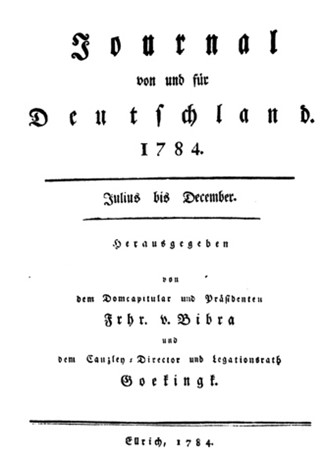Richard B. Apgar is Associate Professor of German at the University of the South in Sewanee, Tennessee. His research focuses on travel and print culture in the long eighteenth century. His current project, tentatively titled Bound-ary Crossings, examines (trans)national aspects of periodicals, the circulation of print, and concepts of cultural unity around 1800. He has published on Karl Philip Mortiz’s Magazin zur Erfahrungsseeelenkunde and metaphors of flooding and excess in periodical introductions in the 1770s and 1780s.
My Research

Journal von und für Deutschland was launched in 1784 by Friedrich Leopold Günther Goeckingk and co-edited by Siegmund von Bibra. In his announcement, Goeckingk, who had edited the Göttinger Musenalmanach and the Hamburger Musenalmanach, sought correspondents from dozens of cities across the expanse of German-speaking Europe. Published monthly through 1792, the Journal drew on this contributor network to fill its pages. Monthly issues would contain »more material and a greater variety than any other book of its type and price.« In real terms, the rubric established twelve sections ranging from plays produced to an index of goods from newly-established factories.
Abstract
Gathering a Nation: Journal von und für Deutschland as Precarious Network
In his May 1783 announcement for Journal von und für Deutschland (1784-1792), Leopold Friedrich von Goeckingk wrote, »in London fließen die Nachrichten aus allen drey Königreichen ungesucht zusammen.« In this formulation, circulation is a force that brings material for publication together like water flowing to a drain. »Ungesucht,« news streams from the three kingdoms and makes itself available for dissemination. Not unlike Latour’s notion of a »center of calculation,« London sits as hub of Goeckingk’s spatial concept. However, »das kann niemals der Fall in Deutschland seyn.« Since its political condition (»in so viele abgesonderten Staaten«) reduces exchange (»Handel«) and association (»Verkehr«) between regions such that they know »wenig oder gar nichts von einander,« Germany, Goeckingk claims, requires a publication to function as this center. Where London ostensibly forms a natural gathering point, Goeckingk’s Journal collects material generated by correspondents scattered across the geographic space named in the title. In the movement of news and information across this simultaneously geographic and aspirational concept, the Journal implicitly forms a precarious network, to invoke Anne Fuchs recent work, which seeks to replicate the center London represents.
Envisioning a moment »in der Folge« when »künftig in Deutschland nicht viel Merkwürdiges« might occur, »wovon in diesem Journale nicht einige Nachricht ertheilt werden sollte,« reveals both the stunning breadth and the uncertain temporal span of this project.
As a case study of the transformational potential and pragmatic limitations of the periodical medium, my discussion examines Journal von und für Deutschland as a precarious network challenged by the borders and regional variations it sought to span.
Recent Publications
»Moritz’s Veil: Observation, the Rupture of Individuality, and Magazin zur Erfahrungsseelenkunde« Goethe Yearbook 27 (2020): 47-62.
»Flooded: Periodicals and the Crisis of Information around 1780,« in Vance Byrd and Ervin Malakaj, eds., Market Strategies and German Literature in the Long Nineteenth Century, (Berlin: De Gruyter, 2020): 25-54.

